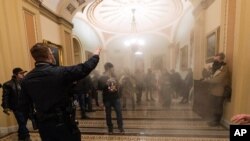Sandy Weyer is the latest Trump supporter to be arrested in connection with the January 6 attack on the U.S. Capitol.
The Pennsylvania woman is accused of breaching the Capitol and filming an assault on a New York Times photographer inside the building while encouraging the attackers to spray the journalist with Chemical Mace.
"Get her out! Mace her!" she can be heard yelling in the video recording of the assault, one of several she posted on Facebook, according to a criminal complaint federal authorities filed against her on Friday.
Weyer was arrested early Monday in her hometown of Mechanicsburg, Pennsylvania, and charged with three misdemeanor counts and one felony count of obstructing Congress' certification of the November presidential election results. The New York Times photographer was not identified in the complaint, but details of the incident matched an account by Times photographer Erin Schaff published on January 7.
Weyer's arrest exemplifies the doggedness with which the FBI is pursuing virtually every person who took part in what officials have decried as an unprecedented assault on American democracy. The attack left five people dead, including a Capitol police officer, and more than 100 other officers injured. Prosecutors say the hours long rampage also caused at least $1.5 million in damage to the historic building.
In recent days, the FBI has made at least a half dozen arrests in connection with the attack. Among them: an employee of the Los Angeles County Department of Public Social Services, a Pennsylvania conspiracy theory podcast host, and a Florida couple featured in a recent HBO documentary about QAnon.
Last week, Attorney General Merrick Garland announced that total arrests had topped 500, highlighting the 100th arrest of a defendant on charges of assaulting a federal law enforcement officer and the first arrest on charges of attacking a journalist.
"I assure the American people that the Department of Justice will continue to follow the facts in this case and charge what the evidence supports to hold all January 6th perpetrators accountable," Garland said in a statement.
What's more, with "hundreds" of additional investigations still ongoing, prosecutors will bring more serious charges against some defendants who have already been charged, according to FBI Director Christopher Wray.
"So this is far from over," Wray told members of the Senate Appropriations Committee on Wednesday. "And with each arrest and each case we bring, not only are we driving toward accountability for the attack but we're also learning more about what was out there beforehand so we can use that to get better moving forward."
The charges against the 500-plus suspects arrested to date fall into three broad categories. At one end of the spectrum are more than 200 defendants accused of illegally entering the Capitol but not engaging in any violence. They face misdemeanor charges such as trespassing and disorderly conduct, both of which carry little to no jail time.
At the other end are some three dozen members of three far-right groups — the Oath Keepers, the Three Percenters and the Proud Boys — who, according to prosecutors, planned and coordinated their attack on the Capitol months in advance. They face multiple felony charges of conspiracy and other offenses.
More serious charges are coming
The rest of the defendants face a combination of lesser misdemeanor charges and more serious felony charges of destruction of property and assaulting police officers.
While an overwhelming majority of criminal defendants in the United States enter into plea agreements with prosecutors, to date only eight defendants in the Capitol attack have pleaded out. In April, Jon Schaffer, an alleged member of the Oath Keepers, became the first to plead guilty to charges related to January 6. In early June, Paul Hodgkins, a Florida man who took a selfie inside the Senate chamber during the Capitol siege, became the second defendant to plead out. And last week, in a significant development in the investigation, Graydon Young, one of 16 members of the Oath Keepers charged with conspiracy to storm the Capitol, pleaded guilty and agreed to cooperate with prosecutors.
"This is a very emotional case. It is a politically charged case. When you marry those two things, it is far more difficult for clients to make rational and intelligent decisions about what is best for them legally," said Randy Zelin, the head of the criminal practice group at the Wilk Auslander law firm in New York and an adjunct professor at Cornell Law School.
More plea agreements in future?
However, the Justice Department is likely to authorize more plea agreements in the coming weeks, added David Haas, a former federal prosecutor who is now a criminal defense attorney in Orlando, Florida.
"You'll probably see those that were charged at the beginning start to receive their plea agreements faster than the more recent defendants indicted," Haas said.
Only one defendant has so far been sentenced. Last week, Anna Morgan-Lloyd, an Indiana woman who described January 6 on Facebook as "the best day ever," was sentenced to three years of probation after pleading guilty to one misdemeanor count and accepting responsibility.
While acknowledging that he was giving Morgan-Lloyd a "break," federal Judge Royce Lamberth cautioned that he didn't want to "create the impression that probation is the automatic outcome here, because it's not going to be."


